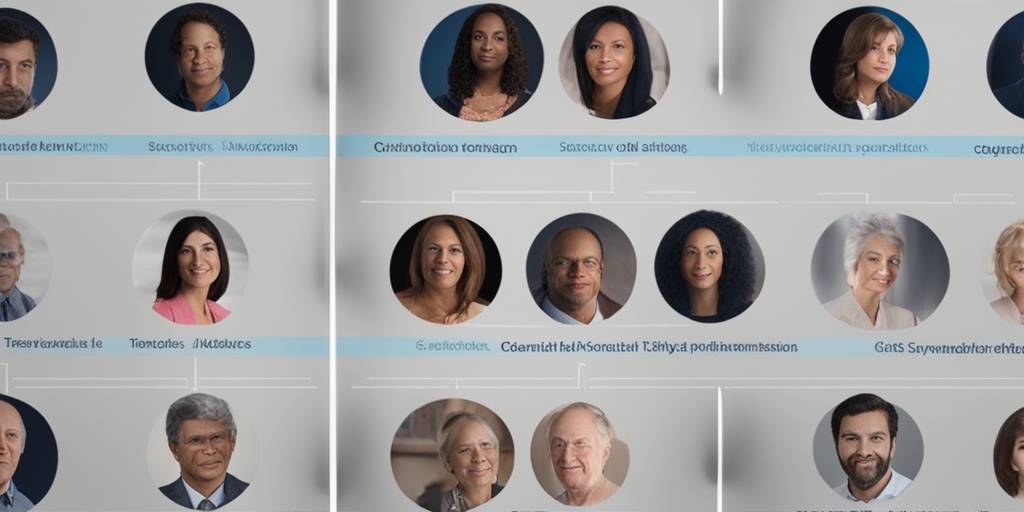“`html
What Is Treacher Collins Syndrome?
Treacher Collins-Franceschetti Syndrome 1 is a rare genetic disorder that primarily affects the development of facial bones and tissues. Named after the British surgeon Edward Treacher Collins, who first described the condition in 1900, this syndrome is characterized by a variety of physical anomalies, particularly in the craniofacial region. It is caused by mutations in the TCOF1 gene, which plays a crucial role in the development of facial structures during embryonic growth.
This condition is inherited in an autosomal dominant manner, meaning that only one copy of the mutated gene from an affected parent can cause the syndrome in their offspring. However, it can also occur as a result of a new mutation, which means that not all cases are inherited. The prevalence of Treacher Collins Syndrome is estimated to be about 1 in 50,000 births, making it a relatively uncommon condition.
Understanding the Genetics
The genetic basis of Treacher Collins Syndrome involves mutations that disrupt the normal function of the TCOF1 gene. This gene is essential for the production of a protein that helps in the formation of craniofacial structures. When this gene is mutated, it can lead to underdevelopment of the bones and tissues in the face, resulting in the characteristic features associated with the syndrome.
Who Is Affected?
While Treacher Collins Syndrome affects individuals of all ethnic backgrounds and genders, the severity of symptoms can vary widely. Some individuals may have only mild features, while others may experience significant challenges related to their craniofacial development. It’s important to note that the syndrome does not affect cognitive abilities; individuals with Treacher Collins Syndrome typically have normal intelligence.
Symptoms of Treacher Collins Syndrome
The symptoms of Treacher Collins Syndrome can vary significantly from person to person, but they generally include a range of craniofacial abnormalities. Here are some of the most common symptoms:
- Facial Features: Individuals may have a flat facial profile, underdeveloped cheekbones, and a small jaw (micrognathia). The eyes may also appear slanted or have a downward tilt.
- Ear Abnormalities: Many individuals with this syndrome have malformed or absent ears, which can lead to hearing loss. Some may have external ear deformities, while others may experience issues with the middle or inner ear.
- Dental Issues: Misalignment of teeth and other dental problems are common due to the underdevelopment of the jaw and facial structures.
- Respiratory Problems: In severe cases, individuals may experience breathing difficulties, especially during sleep, due to the structural abnormalities in the face and throat.
- Vision Problems: Some individuals may have vision issues related to the positioning of the eyes or other ocular abnormalities.
Associated Health Concerns
In addition to the physical symptoms, individuals with Treacher Collins Syndrome may face other health challenges, including:
- Hearing Loss: Due to ear malformations, many individuals experience varying degrees of hearing loss, which can impact communication and social interactions.
- Speech Difficulties: The structural differences in the mouth and throat can lead to challenges in speech development.
- Psychosocial Impact: The visible differences in appearance can lead to social stigma and emotional challenges, making psychological support an important aspect of care.
Living with Treacher Collins Syndrome
While Treacher Collins Syndrome presents various challenges, many individuals lead fulfilling lives with the right support and interventions. Treatment options may include surgical procedures to improve facial appearance and function, hearing aids for auditory issues, and speech therapy to address communication difficulties.
For more information and resources on managing Treacher Collins Syndrome, consider visiting Yesil Health AI, where you can find evidence-based health answers tailored to your needs.
In conclusion, understanding Treacher Collins-Franceschetti Syndrome 1 is crucial for providing appropriate care and support to those affected. With advancements in medical treatment and a supportive community, individuals with this syndrome can thrive and lead meaningful lives. 🌟
“`

“`html
Causes of Treacher Collins Syndrome
Treacher Collins-Franceschetti Syndrome 1 is a genetic disorder that primarily affects the development of facial bones and tissues. Understanding the causes of this syndrome is crucial for both affected individuals and their families. The condition is primarily caused by mutations in specific genes that play a vital role in the development of facial structures during embryonic growth.
Genetic Mutations
The majority of cases of Treacher Collins Syndrome are linked to mutations in the TCOF1 gene, which is responsible for producing a protein called treacle. This protein is essential for the development of craniofacial structures. When mutations occur in the TCOF1 gene, it disrupts the normal production of treacle, leading to the characteristic features of the syndrome.
In addition to TCOF1, mutations in other genes such as POLR1C and POLR1D have also been associated with Treacher Collins Syndrome. These genes are involved in the production of ribosomal RNA, which is crucial for protein synthesis and cellular function. Disruptions in these genes can further contribute to the developmental issues seen in individuals with the syndrome.
Inheritance Patterns
Treacher Collins Syndrome is typically inherited in an autosomal dominant pattern. This means that only one copy of the mutated gene from an affected parent can cause the syndrome in their offspring. However, in some cases, the mutation can occur spontaneously, meaning it is not inherited from either parent. This spontaneous mutation can happen during the formation of reproductive cells or in early embryonic development.
Environmental Factors
While the primary causes of Treacher Collins Syndrome are genetic, some studies suggest that environmental factors during pregnancy may also play a role. Factors such as maternal smoking, certain medications, or exposure to toxins could potentially influence the development of the fetus, although more research is needed in this area.
Risk Factors for Treacher Collins Syndrome
Identifying the risk factors associated with Treacher Collins-Franceschetti Syndrome 1 can help in understanding who may be affected by this condition. While the syndrome is primarily genetic, there are several factors that can increase the likelihood of its occurrence.
Family History
One of the most significant risk factors for Treacher Collins Syndrome is a family history of the condition. If a parent has the syndrome, there is a 50% chance that their child will inherit the mutated gene. This familial link underscores the importance of genetic counseling for families with a history of the syndrome.
Genetic Testing
For individuals with a family history of Treacher Collins Syndrome, genetic testing can provide valuable information. Testing can identify whether a person carries mutations in the TCOF1, POLR1C, or POLR1D genes. This information can be crucial for family planning and understanding the risks for future children.
Gender and Ethnicity
Research indicates that Treacher Collins Syndrome affects both genders equally, but some studies suggest that there may be slight variations in the severity of symptoms based on gender. Additionally, the syndrome occurs across all ethnic groups, although the prevalence may vary slightly among different populations.
Age of Parents
Some studies have suggested that advanced parental age, particularly maternal age, may be associated with an increased risk of genetic mutations. While this is not a definitive risk factor for Treacher Collins Syndrome, it is an area of ongoing research in the field of genetics.
In conclusion, understanding the causes and risk factors of Treacher Collins-Franceschetti Syndrome 1 is essential for affected individuals and their families. By recognizing the genetic basis of the syndrome and the potential risk factors, families can make informed decisions and seek appropriate medical guidance. 🧬
“`

“`html
Diagnosis of Treacher Collins Syndrome
Diagnosing Treacher Collins-Franceschetti Syndrome 1 can be a complex process, primarily because the symptoms can vary significantly from person to person. This genetic disorder primarily affects the development of facial bones and tissues, leading to distinctive facial features. Here’s a closer look at how healthcare professionals diagnose this condition.
Clinical Evaluation
The first step in diagnosing Treacher Collins Syndrome typically involves a thorough clinical evaluation. A healthcare provider will:
- Review the patient’s medical history.
- Conduct a physical examination, focusing on facial features such as the shape of the ears, eyes, and jaw.
- Assess any hearing loss, which is common in individuals with this syndrome.
Genetic Testing
Once a clinical evaluation is complete, genetic testing is often recommended to confirm the diagnosis. This testing can identify mutations in the TCOF1, POLR1C, or POLR1D genes, which are associated with Treacher Collins Syndrome. Genetic testing can provide valuable information, especially for:
- Determining the risk of passing the syndrome to future generations.
- Understanding the specific type of Treacher Collins Syndrome, as there are variations in severity.
Imaging Studies
In some cases, imaging studies such as X-rays, CT scans, or MRIs may be utilized to assess the structure of the skull and facial bones. These imaging techniques help in:
- Identifying any abnormalities in bone structure.
- Planning for potential surgical interventions.
Multidisciplinary Approach
Diagnosing Treacher Collins Syndrome often requires a multidisciplinary approach. In addition to geneticists, healthcare providers may include:
- Otolaryngologists (ear, nose, and throat specialists) for hearing assessments.
- Plastic surgeons for evaluating facial structure.
- Speech therapists to address any communication challenges.
Early diagnosis is crucial as it allows for timely interventions that can significantly improve the quality of life for individuals with Treacher Collins Syndrome. 🩺
Treatment Options for Treacher Collins Syndrome
While there is currently no cure for Treacher Collins-Franceschetti Syndrome 1, various treatment options can help manage symptoms and improve the quality of life for affected individuals. Treatment plans are often tailored to the specific needs of the patient and may involve a combination of medical, surgical, and supportive therapies.
Surgical Interventions
Surgery is often a key component of treatment for Treacher Collins Syndrome, particularly for addressing facial deformities and improving function. Common surgical procedures include:
- Otoplasty: Surgery to correct ear deformities, which can enhance appearance and hearing.
- Facial Reconstruction: Surgical procedures to improve facial symmetry and structure.
- Orthognathic Surgery: Surgery to correct jaw alignment, which can aid in chewing and speaking.
Hearing Aids and Cochlear Implants
Many individuals with Treacher Collins Syndrome experience hearing loss. To address this, audiologists may recommend:
- Hearing Aids: Devices that amplify sound for those with mild to moderate hearing loss.
- Cochlear Implants: Surgically implanted devices that can provide a sense of sound for individuals with severe hearing loss.
Speech and Language Therapy
Speech and language therapy can be beneficial for individuals with Treacher Collins Syndrome, especially if they have difficulty with speech due to facial structure. Therapists can help improve:
- Articulation and clarity of speech.
- Communication skills and social interaction.
Psychosocial Support
Living with Treacher Collins Syndrome can present emotional and psychological challenges. Providing psychosocial support is essential and may include:
- Counseling: Professional support to help individuals cope with the emotional aspects of the syndrome.
- Support Groups: Connecting with others who have similar experiences can provide comfort and understanding.
In conclusion, while Treacher Collins Syndrome presents unique challenges, a comprehensive treatment plan can significantly enhance the quality of life for those affected. With the right support and interventions, individuals can lead fulfilling lives. 🌟
“`

“`html
Living with Treacher Collins Syndrome
Treacher Collins-Franceschetti Syndrome 1 (TCS) is a genetic disorder that primarily affects the development of facial bones and tissues. Individuals with this condition often face unique challenges, but with the right support and understanding, they can lead fulfilling lives. In this section, we will explore the daily experiences of those living with TCS, the common symptoms, and the emotional aspects of managing this condition.
Understanding the Symptoms
The symptoms of Treacher Collins Syndrome can vary widely among individuals, but some of the most common include:
- Facial Abnormalities: This may include underdeveloped cheekbones, a small jaw, and a cleft palate.
- Hearing Loss: Many individuals with TCS experience varying degrees of hearing impairment due to structural abnormalities in the ears.
- Vision Problems: Some may have issues with their eyelids or other eye-related concerns.
- Respiratory Issues: Due to facial structure, breathing difficulties can occur, especially in infants.
These symptoms can lead to challenges in social interactions and self-esteem. However, it’s important to remember that each person with TCS is unique, and their experiences will differ. Many individuals develop strong coping mechanisms and resilience, allowing them to thrive despite their challenges.
Emotional and Social Aspects
Living with Treacher Collins Syndrome can be emotionally taxing. Individuals may face bullying or social isolation due to their appearance, which can lead to feelings of anxiety or depression. It’s crucial for families and friends to foster an environment of acceptance and support. Here are some ways to help:
- Encourage Open Communication: Allow individuals to express their feelings and concerns without judgment.
- Promote Inclusivity: Engage in activities that include individuals with TCS, helping them feel valued and accepted.
- Seek Professional Help: Therapy can be beneficial for both individuals with TCS and their families to navigate emotional challenges.
By addressing these emotional aspects, individuals with Treacher Collins Syndrome can build confidence and develop strong social connections. 💪
Support and Resources for Families
Families of individuals with Treacher Collins-Franceschetti Syndrome 1 often seek resources and support to help navigate the complexities of this condition. Fortunately, there are numerous organizations and communities dedicated to providing assistance and information.
Organizations and Support Groups
Several organizations focus on TCS and related craniofacial conditions. These groups offer resources, advocacy, and community support:
- The Treacher Collins Foundation: This organization provides information, support, and resources for individuals and families affected by TCS.
- Face Equality International: This group advocates for the rights and inclusion of people with facial differences, including those with TCS.
- Local Support Groups: Many communities have local support groups where families can connect, share experiences, and provide mutual support.
Medical Resources
Access to medical care is crucial for individuals with Treacher Collins Syndrome. Families should seek specialists who understand the complexities of TCS, including:
- Craniofacial Surgeons: These specialists can address structural issues and improve function and appearance.
- Otolaryngologists: Ear, nose, and throat specialists can help manage hearing loss and respiratory issues.
- Speech Therapists: For those with speech difficulties, therapy can enhance communication skills.
Additionally, families should consider connecting with genetic counselors who can provide information about the hereditary aspects of TCS and help them understand the implications for future generations. 🧬
Online Communities and Resources
The internet offers a wealth of information and support for families dealing with Treacher Collins Syndrome. Online forums and social media groups can be invaluable for sharing experiences and advice. Some popular platforms include:
- Facebook Groups: Many groups focus on TCS, allowing families to connect and share resources.
- Reddit Communities: Subreddits related to craniofacial conditions can provide a space for discussion and support.
- Webinars and Online Workshops: Various organizations host educational sessions that can help families learn more about TCS and available resources.
By leveraging these resources, families can find the support they need to navigate the challenges of Treacher Collins-Franceschetti Syndrome 1, fostering a sense of community and understanding. 🌍
“`

“`html
Frequently Asked Questions about Treacher Collins-Franceschetti Syndrome 1
What is Treacher Collins-Franceschetti Syndrome 1?
Treacher Collins-Franceschetti Syndrome 1 is a genetic disorder that primarily affects the development of facial bones and tissues. It is characterized by a range of physical features, including underdeveloped cheekbones, a small jaw, and ear abnormalities. This condition is caused by mutations in the TCOF1 gene.
Is Treacher Collins Syndrome painful?
What are the chances of getting Treacher Collins Syndrome?
The chances of inheriting Treacher Collins-Franceschetti Syndrome 1 depend on genetic factors. It is typically inherited in an autosomal dominant manner, meaning that a child has a 50% chance of inheriting the condition if one parent carries the mutation. However, it can also occur as a result of new mutations.
Are there any famous people with Treacher Collins Syndrome?
Yes, there are notable individuals who have been open about their experiences with Treacher Collins-Franceschetti Syndrome 1. One such person is the model and advocate, Millie Bobby Brown, who has used her platform to raise awareness about the condition.
What treatments are available for Treacher Collins Syndrome?
Treatment for Treacher Collins-Franceschetti Syndrome 1 is tailored to the individual’s needs and may include:
- Surgeries to correct facial abnormalities
- Hearing aids or cochlear implants for hearing loss
- Speech therapy to assist with communication
- Dental care for associated oral issues
Early intervention and a multidisciplinary approach can significantly improve the quality of life for those affected.
Can Treacher Collins Syndrome be diagnosed before birth?
Yes, Treacher Collins-Franceschetti Syndrome 1 can sometimes be diagnosed through prenatal imaging techniques, such as ultrasound, which may reveal facial abnormalities. Genetic testing can also confirm the diagnosis if there is a family history of the condition.
How can I support someone with Treacher Collins Syndrome?
Supporting someone with Treacher Collins-Franceschetti Syndrome 1 involves understanding their unique challenges and being there for them emotionally. Encouraging them to seek medical advice and connecting them with support groups can also be beneficial. 💖
“`




